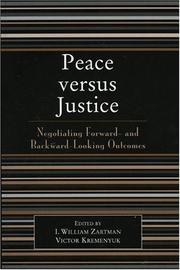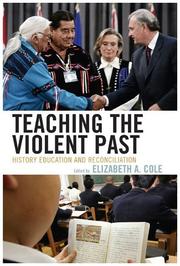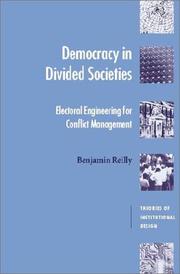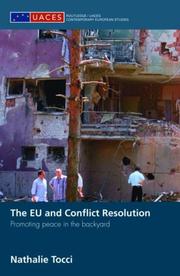| Listing 1 - 10 of 11 | << page >> |
Sort by
|
Book
Year: 1993 Publisher: Washington, D. C. United States Institute of Peace Press,
Abstract | Keywords | Export | Availability | Bookmark
 Loading...
Loading...Choose an application
- Reference Manager
- EndNote
- RefWorks (Direct export to RefWorks)
Book
ISBN: 1775820645 1775820041 Year: 2013 Publisher: Chicago : University of Cape Town Press,
Abstract | Keywords | Export | Availability | Bookmark
 Loading...
Loading...Choose an application
- Reference Manager
- EndNote
- RefWorks (Direct export to RefWorks)
Some of the bloodiest conflicts occurred on the African continent. An Afrocentric perspective is therefore a suitable starting point for research into the possible strategies for post-conflict peacebuilding.The authors of this book consider the problems around the concept of ""post-conflict"" and the blurring of military and civilian roles, analyzing the UN roles in the DRC and Sierra Leone, as well as the African Union Mission in Burundi. The main context of the book, however, is the South African Army's strategy for PCRD in Africa, which has been developed with the African Union's 2006 Post-

ISBN: 1461611962 1299136168 9781461611967 0742536289 9780742536289 0742536297 9780742536296 Year: 2005 Publisher: Lanham, Md. : Rowman & Littlefield,
Abstract | Keywords | Export | Availability | Bookmark
 Loading...
Loading...Choose an application
- Reference Manager
- EndNote
- RefWorks (Direct export to RefWorks)
This book examines the costs and benefits of ending the fighting in a range of conflicts, and probes the reasons why negotiators provide, or fail to provide, resolutions that go beyond just 'stopping the shooting.' A wide range of case studies is marshaled to explore relevant peacemaking situations, from the end of the Thirty Years' War and the Napoleonic Wars, to more recent settlements of the late 20th and early 21st centuries-including large scale conflicts like the end of WWII and smaller scale, sometimes internal conflicts like those in Cyprus, Armenia and Azerbaijan, and Mozambique. Case
Book
ISBN: 1438471823 9781438471822 9781438471815 1438471815 1438471807 Year: 2018 Publisher: Albany : State University of New York Press,
Abstract | Keywords | Export | Availability | Bookmark
 Loading...
Loading...Choose an application
- Reference Manager
- EndNote
- RefWorks (Direct export to RefWorks)
When we open the newspaper, watch and listen to the news, or follow social media, we are inundated with reports on old and fresh conflict zones around the world. Less apparent, perhaps, are the many attempts at bringing former adversaries together. Reconciliation in Global Context argues for the merit of reconciliation and for the need of global conversations around this topic. The contributing scholars and scholar-practitioners?who hail from the United States, South Africa, Ireland, Israel, Zimbabwe, Germany, Palestine, Belgium, Bosnia and Herzegovina, Serbia, Switzerland, and the Netherlands?describe and analyze examples of reconciliatory practices in different national and political environments. Drawing on direct experiences with reconciliation efforts, from facilitating psychosocial intergroup workshops to critically evaluating official policies, they also reflect on the personal motivations that guide them in this field of engagement. Arranged along an arc that spans from cases describing and interpreting actual processes with groups in conflict to cases in which the conceptual merits and constraints of reconciliation are brought to the fore, the chapters ask hard questions, but also argue for a relational approach to reconciliatory practices. For, in the end, what is important is to embrace a spirit of reconciliation that avoids self-interested action and, instead, advances other-directed care.
Conflict management --- Peace-building --- Reconciliation --- Peace making --- Peacemaking --- Reconciliatory behavior --- Quarreling --- Peace-building - Case studies --- Conflict management - Case studies --- Reconciliation - Case studies

ISBN: 9780742551428 0742551423 9780742551435 0742551431 Year: 2007 Publisher: Lanham (Md.) : Rowman and Littlefield,
Abstract | Keywords | Export | Availability | Bookmark
 Loading...
Loading...Choose an application
- Reference Manager
- EndNote
- RefWorks (Direct export to RefWorks)
Peace --- Conflict management --- Study and teaching --- Coexistence, Peaceful --- Peaceful coexistence --- International relations --- Disarmament --- Peace-building --- Security, International --- War --- Study and teaching. --- Peace - Study and teaching. --- Conflict management - Case studies
Book
ISBN: 1282397990 9786612397998 9047431766 9789047431763 9789004164826 9004164820 9781282397996 6612397993 Year: 2008 Publisher: Leiden ; Boston : Martinus Nijhoff Publishers,
Abstract | Keywords | Export | Availability | Bookmark
 Loading...
Loading...Choose an application
- Reference Manager
- EndNote
- RefWorks (Direct export to RefWorks)
The study is the result of an international collaborative project supported and funded by the Carnegie Corporation of New York. This multi-year venture has involved a research team of some forty chapter authors and commentators. The research has been accompanied by three major workshops on project methodology, initial chapter reviews and final discussions. A point was made of including both scholars and practitioners involved in power-sharing settlements in the review process, in the hope that more would be learned about the actual implementation of the settlements under investigation. The project team was united in its wish to explore whether long-standing secessionist conflicts have been addressed effectively through the significant number of self-determination settlements that were generated in response to the wave of internal conflicts of the 1990s. It was also committed to testing whether consociationalist and integrative techniques of conflict settlement really are as mutually exclusive as is sometimes supposed, or whether they can in fact be mutually reinforcing. Finally, the project derives its impetus from the necessity to critically rethink the doctrine of self-determination. One may question whether its traditional, restrictive interpretation will be adequate in confronting the wide variety of future challenges to the territorial integrity of states.
Autonomy --- Conflict management --- Minorities --- Self-determination, National --- Autodeterminación nacional --- Autonomia --- Minorias --- Solución de conflictos --- National self-determination --- Nationalism --- Nation-state --- Nationalities, Principle of --- Sovereignty --- Ethnic minorities --- Foreign population --- Minority groups --- Persons --- Assimilation (Sociology) --- Discrimination --- Ethnic relations --- Majorities --- Plebiscite --- Race relations --- Segregation --- Independence --- Self-government --- International law --- Political science --- Political activity --- Actividad política --- Autonomy - Case studies --- Conflict management - Case studies --- Self-determination, National - Case studies --- Minorities - Political activity - Case studies
Book
ISBN: 0429620128 0429054645 0429622279 9780429054648 9780429617973 0429617976 9780429620126 9780429622274 9780367150372 0367150379 0367785234 Year: 2020 Publisher: London: Routledge/Taylor & Francis,
Abstract | Keywords | Export | Availability | Bookmark
 Loading...
Loading...Choose an application
- Reference Manager
- EndNote
- RefWorks (Direct export to RefWorks)
"This book seeks to interrogate how contemporary policy issues become 'securitized' and, furthermore, what the implications of this process are. A generation after the introduction of the concept of securitization to the security studies field, this book engages with how securitization and de-securitization 'works' within and across a wide range of security domains including terrorism and counter-terrorism, climate change, sexual and gender based violence, inter-state and intra-state conflict, identity, and memory in various geographic and social contexts. Blending theory and application, the contributors to this volume - drawn from different disciplinary, ontological, and geographic 'spaces' - orient their investigations around three common analytical objectives: revealing deficiencies in and through application(s) of securitization; considering securitization through speech-acts and discourse as well as other mechanisms; and exposing latent orthodoxies embedded in securitization research. The volume demonstrates the dynamic and elastic quality of securitization and de-securitization as concepts that bear explanatory fruit when applied across a wide range of security issues, actors, and audiences. It also reveals the deficiencies in restricting securitization research to an overly narrow set of issues, actors, and mechanisms. This volume will be of great interest to scholars of critical security studies, international security, and International Relations"--
Security, International --- National security --- Conflict management --- National security policy --- NSP (National security policy) --- Security policy, National --- Economic policy --- International relations --- Military policy --- Collective security --- International security --- Disarmament --- International organization --- Peace --- Government policy --- Security, International - Case studies --- National security - Case studies --- Conflict management - Case studies --- empirical applications; Climate Change; Conflict Management; Copenhagen School; constructivism; desecuritization; gender-based violence; inter-state conflict; processes; securitization; securitization applications; terrorism

ISBN: 0521793238 0521797306 0511016956 0511047266 0511174357 1280433027 051115416X 0511328281 0511491107 110712218X 9780511016950 9780511154164 9780521793230 9780511491108 9786610433025 661043302X 9780521797306 9780511047268 9780511174353 9781280433023 9780511328282 Year: 2001 Publisher: Cambridge Cambridge University Press
Abstract | Keywords | Export | Availability | Bookmark
 Loading...
Loading...Choose an application
- Reference Manager
- EndNote
- RefWorks (Direct export to RefWorks)
Democracy is inherently difficult in societies divided along deep ethnic cleavages. Elections in such societies will often encourage 'centrifugal' politics which reward extremist ethnic appeals, zero-sum political behaviour and ethnic conflict, and which consequently often lead to the breakdown of democracy. Reilly examines the potential of 'electoral engineering' as a mechanism of conflict management in divided societies. He focuses on the little-known experience of a number of divided societies which have used preferential, vote-pooling electoral systems - such as Papua New Guinea, Sri Lanka, Northern Ireland and Fiji. Examination of these cases shows that electoral systems which encourage bargaining between rival political actors, which promote the development of broad-based, aggregative political parties and which present campaigning politicians with incentives to attract votes from a range of ethnic groups can, under certain conditions, encourage the development of moderate, accommodatory political competition in divided societies.
Political systems --- Elections --- Conflict management --- Gestion des conflits --- Conflict management. --- Democracy. --- Democracy - Case studies. --- Elections. --- Government - General --- Law, Politics & Government --- Political Institutions & Public Administration - General --- Democracy --- #SBIB:014.AANKOOP --- #SBIB:324H42 --- #SBIB:324H71 --- Self-government --- Political science --- Equality --- Representative government and representation --- Republics --- Conflict control --- Conflict resolution --- Dispute settlement --- Management of conflict --- Managing conflict --- Management --- Negotiation --- Problem solving --- Social conflict --- Crisis management --- Electoral politics --- Franchise --- Polls --- Politics, Practical --- Plebiscite --- Political campaigns --- Politieke structuren: verkiezingen --- Politieke verandering: modernisatie, democratisering, regional development --- Social Sciences --- Political Science --- Elections - Case studies --- Conflict management - Case studies --- Democracy - Case studies

ISBN: 9780415413947 041541394X 9780203960929 9781134123339 9781134123377 9781134123384 9780415479769 Year: 2007 Volume: 1 Publisher: Abingdon: Routledge,
Abstract | Keywords | Export | Availability | Bookmark
 Loading...
Loading...Choose an application
- Reference Manager
- EndNote
- RefWorks (Direct export to RefWorks)
Conflict management --- Ethnic relations --- International relations --- Gestion des conflits --- Relations interethniques --- Relations internationales --- Case studies --- Cas, Etudes de --- European Union countries --- Pays de l'Union européenne --- Foreign relations --- Relations extérieures --- Case studies. --- #SBIB:327.7H233 --- -Ethnic relations --- -International relations --- 327.172094 --- Coexistence --- Foreign affairs --- Foreign policy --- Global governance --- Interdependence of nations --- International affairs --- Peaceful coexistence --- World order --- National security --- Sovereignty --- World politics --- Inter-ethnic relations --- Interethnic relations --- Relations among ethnic groups --- Acculturation --- Assimilation (Sociology) --- Ethnic groups --- Ethnology --- Social problems --- Sociology --- Minorities --- Race relations --- Conflict control --- Conflict resolution --- Dispute settlement --- Management of conflict --- Managing conflict --- Management --- Negotiation --- Problem solving --- Social conflict --- Crisis management --- Europese Unie: externe relaties, buitenlands- en defensiebeleid (ook WEU) --- -EU countries --- Euroland --- Europe --- Ethnic relations. --- International relations. --- Foreign relations. --- Crisis managementEuropese Unie: externe relaties, buitenlands- en defensiebeleid (ook WEU) --- Case studiesEuropean Union countries --- EuropeForeign relations --- -Foreign relations --- Pays de l'Union européenne --- Relations extérieures --- Conflict management - Case studies --- Ethnic relations - Case studies. --- European Union countries - Foreign relations

ISBN: 9789280811407 9280811401 Year: 2007 Publisher: New York, NY : United Nations University,
Abstract | Keywords | Export | Availability | Bookmark
 Loading...
Loading...Choose an application
- Reference Manager
- EndNote
- RefWorks (Direct export to RefWorks)
Emigration and immigration --- Immigrants --- Conflict management --- World politics --- Emigration et immigration --- Gestion des conflits --- Politique mondiale --- Political aspects --- Case studies. --- Political activity --- Aspect politique --- Cas, Etudes de --- Activité politique --- #SBIB:327.6H02 --- Internationale problemen: bijzondere vraagstukken --- Conflict management -- Case studies. --- Emigration and immigration -- Political aspects -- Case studies. --- Immigrants -- Political activity -- Case studies. --- World politics -- Case studies. --- Political Science --- Law, Politics & Government --- Immigration & Emigration --- Criminal liability (International law) --- Crimes against humanity --- Atrocities --- Truth commissions --- Reconciliation --- Law, General & Comparative --- Activité politique --- Colonialism --- Global politics --- International politics --- Political history --- Political science --- World history --- Eastern question --- Geopolitics --- International organization --- International relations --- Emigrants --- Foreign-born population --- Foreign population --- Foreigners --- Migrants --- Persons --- Aliens --- Immigration --- International migration --- Migration, International --- Population geography --- Assimilation (Sociology) --- Colonization
| Listing 1 - 10 of 11 | << page >> |
Sort by
|

 Search
Search Feedback
Feedback About UniCat
About UniCat  Help
Help News
News